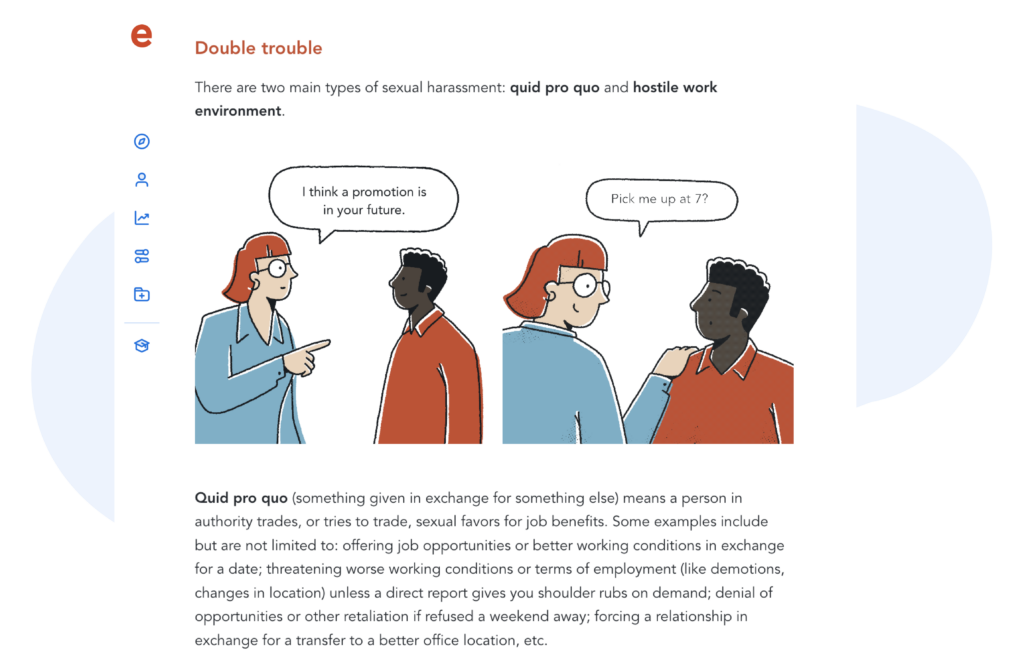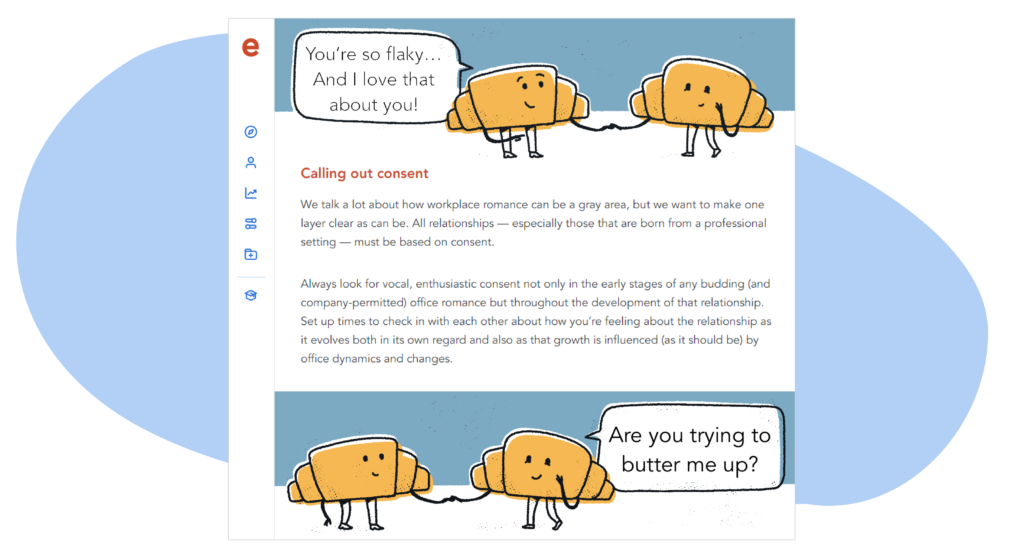In 1980, Dolly Parton, Lily Tomlin, and Jane Fonda brought the widespread issue of sexual harassment in the workplace to Hollywood with 9 to 5. The now-classic comedy follows three women as they get revenge against their boss for all kinds of sexist behavior, including trying to blackmail Parton’s character into sleeping with him: “It’s very simple. You come over to my house for the night, and I’ll forget the whole thing.”
In 9 to 5, the women have to take matters of workplace harassment into their own hands. But in real life, employees of the time were finally getting some real legal recourse. The same year the movie was released, the Equal Employment Opportunity Commission (EEOC) established their first-ever guidelines on workplace sexual harassment. The guidelines defined two types of unlawful behavior, including “quid pro quo” sexual harassment like the boss’s tit-for-tat offer in 9 to 5.
While a lot has changed in workplaces since 1980 — no more three-martini lunches, filing cabinets, or actual nine-to-five jobs — the issue of offering job benefits in return for sexual favors is, unfortunately, as relevant as ever.
Here’s what you need to know about regulations against quid pro quo sexual harassment, along with examples and how to report it.
What is sexual harassment?
First, it’s important to understand sexual harassment more broadly. Sexual harassment is a form of sex discrimination that violates Title VII of the Civil Rights Act of 1964, which applies to employers with 15 or more employees. The EEOC defines sexual harassment as including:
- Unwelcome sexual advances
- Requests for sexual favors
- And other verbal or physical conduct of a sexual nature
Sexual harassment can include offensive remarks about a person’s sex, even if not sexual in nature. And, as we explicitly saw during the COVID-19 pandemic, harassment (sexual or otherwise) can happen online as well as in-person.

The EEOC’s 1980 guidelines defined two types of unlawful sexual harassment: quid pro quo and hostile work environment.
What is quid pro quo harassment?
The Latin phrase quid pro quo translates to “something for something” or “one thing for another.” While the term applies to all kinds of scenarios where someone offers a favor with the expectation of getting a favor in return, when used in the workplace, it has a particularly negative connotation with sexual harassment.
While every case differs (and the two types may coexist), quid pro quo sexual harassment occurs when a person in authority trades — or tries to trade — sexual favors for job benefits. This could look like a manager promising a job opportunity or promotions for a direct report in exchange for sexual favors, and even retaliating against the direct report if they refuse.
A hostile work environment is when unwelcome sexual conduct is severe or pervasive enough to change the conditions of employment and create an abusive environment.
In order to establish quid pro quo harassment, employees have to show that the response to the unwelcome advances actually negatively impacted tangible aspects of their employment (such as compensation or a promotion). If Dolly Parton’s character was fired in 9 to 5 after refusing to sleep with her boss, for example, she would likely have a case for quid pro quo sexual harassment.
On the other hand, if a supervisor or employee merely threatens to do something, but never actually follows through, the legal case for quid pro quo gets tricky. Intimidation is, of course, still harmful and, depending on the circumstances, employees may be able to make a case for these threats as a hostile work environment instead.

Example of quid pro quo harassment
Let’s say Racquel, who started at her new job three months ago, goes out to dinner with her co-workers to celebrate a new client. Even though she’s new, she was instrumental in not only renewing the client’s contract, but also increasing their monthly retainer. Her team is really proud to have her on board and has been singing her praises to their department’s director.
At the dinner, Racquel meets the director, Marcus, for the first time. He congratulates her on the renewal and they briefly chat. The next day at the office, Marcus comes up to her desk: “Last night was fun, wasn’t it?” Racquel responds, “Yes, Urie always picks the best restaurants!” Then Marcus replies, “I’ve got good taste, too. If you’re interested.” Racquel starts to feel a bit uncomfortable: “Oh, thanks. I’ll let you know.”
The next week, Marcus stops by her desk again. He asks her if she’s free for coffee to discuss a new potential client, and — wanting to make a good impression with her boss’s boss — she reluctantly agrees. At the coffee, however, Marcus seems more interested in learning about her personal life than her professional experience. When Racquel asks about the potential client, he smirks and says, “Well, I’ve got a very exciting project in the works, but you’ll have to agree to get dinner with me first.”
Racquel declines and says she has to get to a meeting. The next day, her manager tells her there’s been a “restructure,” and she’s being transferred to another team — one that has noticeably less growth potential than her current job.
Racquel’s employment was directly impacted by her refusal to go on a date with the director, and she should immediately report the quid pro quo harassment claim. But the situation Racquel experienced isn’t the only example of quid pro quo sexual harassment. Other examples include but aren’t limited to:
- Offering better work conditions in exchange for a date
- Threatening terms of employment (like demotions) unless a direct report gives you a shoulder rub
- Forcing someone to engage in a sexual relationship to get a promotion
How to report (and prevent) quid pro quo sexual harassment
So, how should Racquel report the above interaction with Marcus?
If Racquel feels safe, she should inform her harasser Marcus directly that the conduct is unwelcome (and keep a record of this). Next, she should look at her company’s internal policies on harassment, which should identify how to report an incident. Racquel is not required to make a report directly to her manager, and can report the incident to any manager (depending on who she feels comfortable with), as all managers who observe or are informed of allegations of harassment conduct must pass potential instances of harassment up the chain.
Racquel can also report the conduct to relevant government agencies, such as the EEOC. When the EEOC investigates whether there is reasonable cause to believe harassment occurred, they review the whole record, such as:
- The circumstances
- The nature of the unwelcome advances
- And the context in which the incident occurred
And while they make determinations based on the submitted information, the EEOC generally finds harassment to be unlawful where “enduring the offensive conduct becomes a condition of continued employment” or “the conduct is severe or pervasive enough to create a work environment that a reasonable person would consider intimidating, hostile, or abusive.” A situation is also more likely to be found to be illegal harassment if it happens more than once or if the conduct gets even more egregious over time.
Of course, the best thing to do is to speak up before the behavior gets out of hand — and that’s on everyone, not just the targets of harassing conduct like Racquel. Part of creating an inclusive, safe work environment is looking out for each other and investing in proactive solutions, like sexual harassment training, to promote ethical behavior at work right from the start.
And speaking of sexual harassment training, have you checked out Ethena’s?
Why Ethena?
We know there’s a lot of sexual harassment training providers out there. But not all are created equally. And not all are designed to actually change workplace behaviors. So let’s dive in.
1. Our content is evidence-based
We partner with lawyers and educators to make sure it does the job. We know harassment prevention training is mandated, so if your workplace is in need of an effective sexual harassment prevention that dives into quid pro quo, we’ve got you covered. We even keep up with sexual harassment training requirements state-by-state, which includes, but is not limited to:
2. Our trainings are engaging
(And dare we say, oftentimes entertaining: did we mention we work with artists, teachers, and even playwrights?) Here’s the bottom line: We know quid pro quo is a serious topic, and while we treat it seriously, we also know it needs to be delivered in an engaging way so that employees actually pay attention. Because what’s the point of making another dry, boring harassment prevention training? It’s actually the reason we were born. Our co-founders, both women, had had enough of ineffective harassment trainings, and so they started Ethena.
But not only were they on the right track, a study later done by Gallup confirms that training that is enjoyed, is actually effective. So we mix it up with comics, multimedia, video, interactive quizzes, and more within our Ethena platform.
3. Our trainings are loved
Did you know there are studies that prove that bad sexual harassment training has actually led to an increase in sexual harassment in the workplace? Yah…we were shocked too. But that’s why we take our trainings, and our harassment prevention training, seriously. It’s important to make them fun, and to make them…well…good.
But don’t take our word for it. We’ve had over 1 million employees like our training (and they gave our courses a 93% positive rating!), making it more likely that they’ll incorporate the takeaways in real life to adapt their behaviors and practices in your workplace.
4. We make your job easier!
Whether your on a HR or People team, or you sit in the Compliance and Legal department, other administrators like you love us. Check us out on G2, where you’ll see many third-party reviews of others singing our praises. We designed our platform (paired with our great training) to save administrators of all types an average of 145/hours of time. Thanks to our software integrations, we can integrate easily with your HRIS painlessly, or we can integrate with your Slack or Teams chat so we send the automated training reminders so you don’t have to.
Whatever you need done, we (pretty much) have you covered.
The final word
Ethena is a modern compliance training platform that delivers current, cringe-free content that employees actually enjoy. Request a sample from our Harassment Prevention training to see for yourself! If you’re ready to bring complex issues like quid pro quo sexual harassment to life through thoughtful real-world examples, dynamic multimedia, and actionable next steps, let’s talk to see if Ethena is right for your company.











